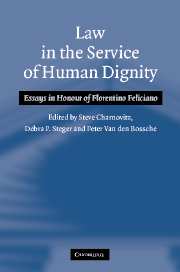Book contents
- Frontmatter
- Contents
- List of contributors
- Preface
- Biographical note
- List of abbreviations
- PART I Reflections on the contributions of Florentino Feliciano to international law
- PART II Insights into the World Trade Organization
- 5 Justice Feliciano and the WTO environmental cases: laying the foundations of a ‘constitutional jurisprudence’ with implications for developing countries
- 6 International trade law, human rights and theories of justice
- 7 Developing countries and the international trading system
- 8 North–South issues of foreign direct investments in the WTO: is there a middle-of-the-road approach?
- 9 The participation of developing countries in WTO dispute settlement and the role of the Advisory Centre on WTO Law
- 10 Reform of the WTO dispute settlement system: what to expect from the Doha Development Round?
- 11 Interpretation and Application of WTO Rules: Florentino Feliciano and the First Seven
- 12 Dispute settlement in the WTO: on the trail of a court
- 13 A proposal to introduce an Advocate General's position into WTO dispute settlement
- 14 Arbitration at the WTO: a terra incognita to be further explored
- 15 The challenges to the legitimacy of the WTO
- 16 The World Trade Organization after Cancún
- PART III The changing landscape of investment arbitration
- PART IV New challenges in international adjudication
- Bibliography of works by Florentino Feliciano
- Index
13 - A proposal to introduce an Advocate General's position into WTO dispute settlement
from PART II - Insights into the World Trade Organization
Published online by Cambridge University Press: 29 July 2009
- Frontmatter
- Contents
- List of contributors
- Preface
- Biographical note
- List of abbreviations
- PART I Reflections on the contributions of Florentino Feliciano to international law
- PART II Insights into the World Trade Organization
- 5 Justice Feliciano and the WTO environmental cases: laying the foundations of a ‘constitutional jurisprudence’ with implications for developing countries
- 6 International trade law, human rights and theories of justice
- 7 Developing countries and the international trading system
- 8 North–South issues of foreign direct investments in the WTO: is there a middle-of-the-road approach?
- 9 The participation of developing countries in WTO dispute settlement and the role of the Advisory Centre on WTO Law
- 10 Reform of the WTO dispute settlement system: what to expect from the Doha Development Round?
- 11 Interpretation and Application of WTO Rules: Florentino Feliciano and the First Seven
- 12 Dispute settlement in the WTO: on the trail of a court
- 13 A proposal to introduce an Advocate General's position into WTO dispute settlement
- 14 Arbitration at the WTO: a terra incognita to be further explored
- 15 The challenges to the legitimacy of the WTO
- 16 The World Trade Organization after Cancún
- PART III The changing landscape of investment arbitration
- PART IV New challenges in international adjudication
- Bibliography of works by Florentino Feliciano
- Index
Summary
Introduction
Thanks to the legal statesmanship of members of the World Trade Organisation (WTO) Appellate Body and to support of WTO members, the legal procedures established under the Understanding on Rules and Procedures Governing the Settlement of Disputes (DSU) have enjoyed very considerable success. But the DSU remains a work in progress. Much can still be done to develop and refine this process. A host of issues, some reflecting policy choices, some more strictly legal, remain to be resolved. By no means have all the concerns of negotiators in 1994 been answered. Some have proven to be well-founded, and new problems have arisen which challenge both the procedures and the rules of the DSU. As a contribution to the search for solutions, this chapter proposes the creation of a new position attached to the DSU process – that of the Advocate General.
The Advocate General (AG) would participate in WTO dispute settlement procedures. A roster of Advocates General should be created to serve both panels and the Appellate Body. Given the nature of the function, the roster should be composed exclusively of jurists, knowledgeable in WTO procedure and law, and would be selected by the Dispute Settlement Body (DSB). An AG would be designated to follow each dispute. His or her principal function would be to participate in the dispute settlement procedures from the point that a panel is constituted to the point that the Appellate Body has rendered its decision.
- Type
- Chapter
- Information
- Law in the Service of Human DignityEssays in Honour of Florentino Feliciano, pp. 159 - 180Publisher: Cambridge University PressPrint publication year: 2005

